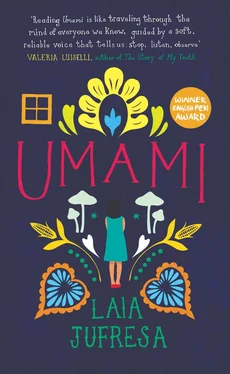‘Suddenlue is when you’re fine one minute and sad the next.’
‘Amazing!’
‘Hospitachio is the pistachio green color of hospitals. Burgunlip is the color of your mouth after a few glasses of red wine. Insomnlack is for the dark rings under sleepless eyes. Rainboil is that complex blend of petrol colors you see on the tarmac at filling stations. You know the one?’
‘You’ve got a talent, missy,’ Chela concludes. ‘And remember: talent doesn’t grow on trees. My happy thing is my hotel.’
It’s not actually hers, but that’s what she calls it: ‘my hotel’. Entitlement never goes unnoticed by Marina. Chela recaps her three years on Mazunte beach: she started out waiting tables, and slowly climbed the ladder to become manager. She talks about the turtles and their little eggs, about the police bribes, and the insufferably ignorant tourists; she talks about a Colombian, an Irishman, the best sex of her life, the best weed of her life, high levels of THC. Or did she say OCD? Marina can’t concentrate with the food there in front of her. And because she doesn’t like how Chela interrupted her: she had more colors, tens of colors to tell her.
‘How old are you?’ she asks.
‘Thirty-nine. I told you in the kitchen.’
‘Right.’
Marina pushes pieces of crepe around her plate. She ate almost half of it with relative ease, when it was still hot. But now that it’s gone cold and sticky she can’t face another morsel. And right there and then, as she tries to think up a way to clear the table without offending Chela, she decides whose side she’s on. Even if there are no sides here, she doesn’t care. She’s on Pina’s side. She’s on Linda’s side. She’s with Belldrop Mews. She stands with the people who face city life head on; who take the rough with the smooth. What is this beach-creature — this siren, this goldfish — doing in her house anyway?
Chela is showing her photos of the hotel on her phone, but this only disenchants Marina further. From somewhere inside of her, her brother demands, ‘Is-this-what-you-left-your-daughter-for? For a tan and a nametag? For a joint and a hammock?’ As much as Marina wouldn’t mind having a go at all those sunny, jaunty, multicultural experiences herself, they just don’t seem appropriate for Chela. Not at her age! Her nametag reads Isabelle . Please! Marina is presented with the clearest picture of Chela’s particular brand of confusion — the kind that smells of Indian Sandalwood but is barely distinguishable from the scent of church incense —, and she feels nothing but disgust for it. At the same time, and quite unexpectedly, Marina welcomes a new, spontaneous admiration for her mother, who is very submissive, it’s true, but at least isn’t confused. Señora Mendoza distrusts all kinds of smoke. She never bought into either the hippies or the puritans, and she boils cloves and orange peel at the first whiff of a cigarette in the house.
Right there and then, Marina knows what she has to do, and not just as an excuse to get away from the food on the table, but because what she’s about to say has to be said. She’s known since the kitchen and has just been putting it off. So now she gets up and carries her plate to the sink, and when she comes back she puts one foot up on a chair, props herself against her knee, lights a cigarette and says, ‘I have to tell you something, OK?’
She’s doing it all wrong. She knows she’s doing it all wrong, but the hospital jargon has taken the reins.
‘Empowerment,’ she hears in her head. Power is a bucking bronco. You have to mount it. It’s a rabid bronco and you have to take a single running jump to get on. At least that’s what goes on in Marina’s head every time someone mentions empowerment.
Chela has her eyebrows raised, amused but also attentive, open. She puts her phone down.
‘Luz. Linda and Víctor’s little girl?’
‘Yes…’
Marina sits down. The bronco has bolted. She looks at the table, suddenly ashamed. She doesn’t want to be the one to say it. It’s not a happy thing, for starters, and moreover it has nothing to do with her. There’s a spot of caramel on the plastic tablecloth. Marina rubs it off with a serviette and the serviette gets all clogged up in the caramel, breaks apart and makes tiny paper tacos.
‘What about her?’ asks Chela.
‘She died. Two years ago.’
All the air leaves Chela’s body. You can hear it — one long breath — and in its wake, a feeble whimper. She also raises her knuckles to her mouth, frowns, and bites her hand. A moment of transparent emotion which reminds Marina of their age gap, because she doesn’t remember ever having reacted to anything like that: with an exhalation of empathetic pain.
A moment later, Chela gets up and goes to the sofa. She rolls a joint, and the whole time her eyes weep in that same disconnected way, as if they were simply raining. Under her breath, over and over again she says, ‘Fucking hell.’ Marina joins her on the sofa and they smoke in silence, each of them perched on one end, separated by a small lake of yellow vinyl and an ashtray with the words ‘The Mustard Mug’ on it. Neither woman’s feet touch the ground: Marina is hugging her knees and Chela has her legs crossed in lotus. On the radio, Nina Simone melts the words ‘daddy’, ‘sugar’, ‘bowl’.
‘I miss him,’ Marina thinks. ‘How sick am I?’
She misses her daddy like one misses the light of a house where you no longer live. A subtle but unremitting absence: his sullenness, a phantom limb. Or not his sullenness, but certainly the tension he planted in the air. And the other thing: the subsequent release. The exhaustion the family collapsed into after he’d walked off slamming the door, like a kind of post-coital bliss, only post-violence. A silence so passive it felt like peace.
Chela lets out a snotty giggle.
‘One time,’ she says, pointing with her chin to the portrait of Doctor Vargas, ‘Beto went to wake up Noelia in the middle of the night because I had a terrible pain. She came round in her nightgown, checked me over and diagnosed me with trapped wind. That’s what she said to me: “Don’t worry, Chelita, this is what we call ‘trapped wind’, and it’ll pass in no time.” She gave me a few Pepto-Bismols or something like it and sent me to bed. But the next day I went to the hospital and it turned out I had peritonitis.’
‘One time,’ Marina says, ‘my dad put on a show with soap bubbles just for me.’
Someone had hired out the restaurant for a birthday party and Marina was in the kitchen when a clown went in to ask for a tray with some water. Up until that moment, she hadn’t minded being the girl in the kitchen. In fact, she liked it, because she felt superior to all the other kids who didn’t work. But the clown thing she did mind, Marina explained, because they weren’t allowed out of the kitchen, and she and her brother had to watch the show through the round windows in the swing doors, Marina propped on an upturned bucket which she had to move each time a waiter went in or out. But later that same night, among the remaining balloons and the chairs already turned upside down, her dad rehashed the show for her in a modest private function. He made her sit down at the table in the middle of the restaurant, then served her a Coca-Cola in a wine glass and all of the leftover cake — half the birthday girl’s name still legible in the icing. Whereas the clown had used two sticks and a rope to make his bubbles, her father filled a soup bowl with warm water and washing-up liquid. He wet his hand in the mixture and then slid the tip of his thumb outwards against his index fingertip, forming, once the two fingertips were touching, a small, thin film. He took a drag of his cigarette and exhaled into the film between his fingers, which inflated into a bubble filled with smoke. She wanted the bubbles to last longer. That’s what she remembers most clearly: that they lasted a very short time, less than normal bubbles, because they never really managed to float. She asked her dad to stop doing it with the smoke, but he wanted to do them like that. It was one of the clown’s tricks. The bubbles came out a kind of green-gray, and when they popped a waft of smoke hung in the air for a moment before disappearing. Back then Marina didn’t have a smoker’s mentality, and wasn’t able to appreciate what she now points out to Chela:
Читать дальше












